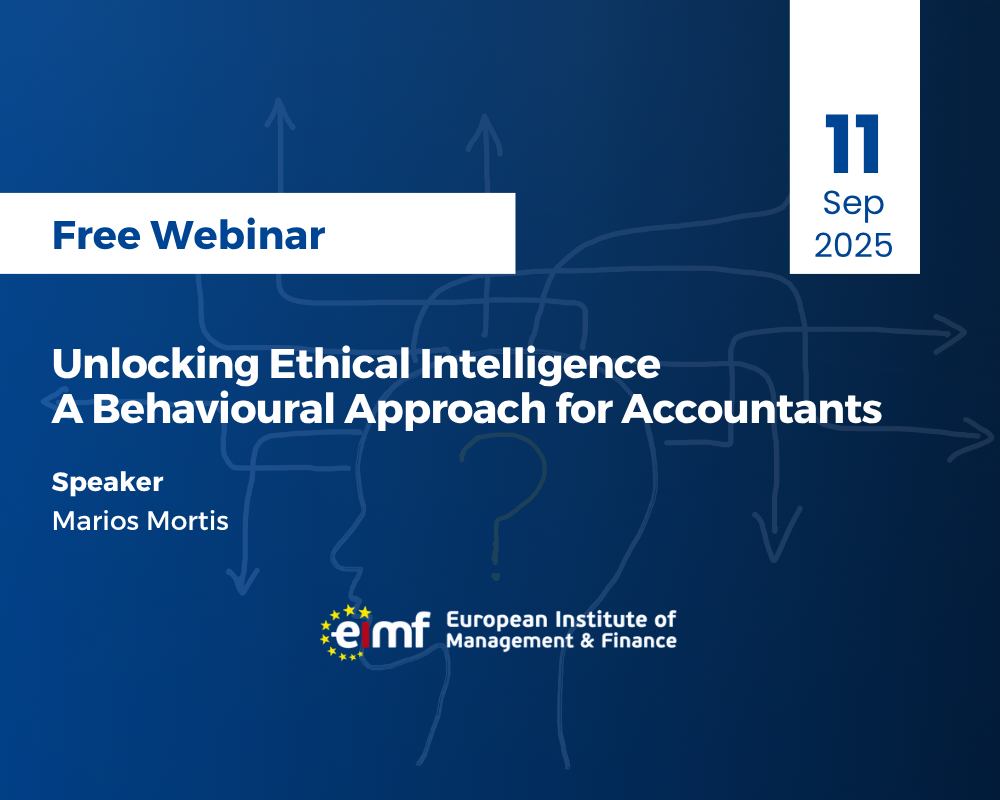Unlocking Ethical Intelligence | A Behavioural Approach for Accountants

Are you an accounting professional committed to integrity, yet sometimes wonder why ethical dilemmas feel so complex?
Traditional ethics training teaches you what to do, but often falls short of explaining why even well-meaning individuals can make unconscious missteps. This webinar explores the fascinating psychology behind ethical choices, equipping you with essential insights to strengthen your professional judgement.
In today’s fast-paced financial landscape, understanding the subtle cognitive biases and situational pressures that influence decision-making is not just an advantage, it’s a necessity. This is not just another ethics session; it’s a transformative learning experience designed to provide you with practical strategies to recognise, manage, and prevent ethical pitfalls in your everyday practice.
Learning Objectives
By the end of this webinar, participants will be able to:
• Define behavioural ethics and distinguish it from traditional ethics.
• Identify common cognitive biases affecting ethical decision-making in accounting.
• Analyse ethical challenges using real-world case studies.
• Apply the IFAC Code of Ethics from a behavioural perspective.
• Recognise and mitigate psychological influences on ethical decisions.
• Use practical tools and strategies to promote ethical behaviour within organisations.
Webinar Agenda
Introduction to Behavioural Ethics in Accounting
• What is behavioural ethics?
• How it differs from rules-based ethics.
• Why behavioural ethics is crucial in accounting.
• The role of psychology in ethical failures.
Common Cognitive Biases Affecting Accountants
• Key biases: anchoring, confirmation bias, overconfidence, framing, ethical fading.
• Real-world examples from financial reporting and audit judgements.
• The concept of bounded ethicality, ethical lapses without unethical intent.
Behavioural Ethics Challenges in Accounting
• Typical ethical dilemmas accountants face:
– Client vs. public interest.
– Confidentiality vs. whistleblowing.
– Pressure to alter numbers.
• Introduction to two case studies.
Case Study Analysis – Part 1: SME Case
The Silent Rounding
• A small firm is asked by a loyal client to “smooth results.” A junior accountant faces a moral crossroads.
• Key Themes: Loyalty bias, conformity, fear of whistleblowing, culture in small teams.
Case Study Analysis – Part 2: Public Company Case
The Missing Disclosure
• A CFO delays disclosure of a material liability to protect share price and bonus targets.
• Key Themes: Framing effect, ethical fading, pressure from performance metrics.
Practical Strategies to Foster Ethical Behaviour
• Using behavioural nudges: default choices, reminders, and framing.
• Encouraging ethical reflection and self-awareness through training.
• Role of organisational culture, leadership, and ethical codes.
Applying the IFAC Code of Ethics Through a Behavioural Lens
• Quick guide to the five fundamental principles:
– Integrity
– Objectivity
– Professional competence and due care
– Confidentiality
– Professional behaviour
• How behavioural science helps professionals uphold these values.
Interactive Scenario-Based Activity
• One realistic dilemma scenario is presented.
• Live polling or breakout groups explore:
– What biases are at play?
– How would participants respond?
– What’s the best ethical course?
• Group reflection and summary.
Q&A and Wrap-up
• Live participant questions.
• Summary of key takeaways:
– Ethics is about habits, not just rules.
– Behavioural awareness leads to better decision-making.
– Continuous ethical development is essential.
Why You Should Attend This Webinar
Ethical dilemmas are increasingly complex, demanding more than just rule-following. This webinar delves into behavioural ethics, revealing how psychological biases unconsciously sway your decisions. Through real-world case studies and actionable strategies, you’ll learn to identify and mitigate these “blind spots,” making sounder, more objective choices. Elevate your professional integrity and contribute to a stronger ethical culture, all while earning valuable CPD credits.
Participants who attend the full webinar will receive a Certificate of Attendance and earn 1 CPD unit.
Speaker | Marios Mortis | Trainer & Accountancy Programmes Leader
Organised by the AccountingWise Centre | Promoting professional integrity, critical thinking, and excellence in accounting and finance education.




![The Evolving Landscape of [Modern] Marketing](https://eimf.eu/wp-content/uploads/2025/09/EIMF-Events-Page-300x240.png)



